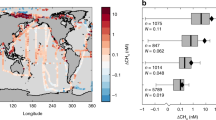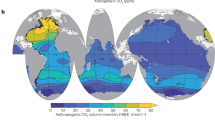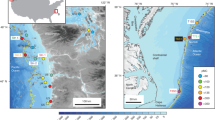Abstract
ATMOSPHERIC concentrations of methane, an important greenhouse gas, have increased significantly over the past few decades1,2. Although attention has been focused on anthropogenic sources, data from ice cores show that large changes in atmospheric methane concentrations have occurred over glacial–interglacial time scales, indicating that there is significant variability in natural methane fluxes3,4. The surface waters of the oceans are often supersaturated with methane, which implies that the oceans are a net source, although their contribution to the global methane budget is small relative to other sources4. Here we report high concentrations of methane in the Arabian Sea, and calculate that the flux of methane to the atmosphere is up to five times greater than the previously reported average ocean flux. Methane production is associated with high phytoplankton biomass, which is closely coupled with the monsoon-driven upwelling of nutrient-rich water. We calculate that the Arabian Sea (representing 0.43% of the total surface area of the world's oceans) could account for between 1.3 and 133% of the current estimates of the open-ocean source of methane. Our results do not alter the view that the oceans are a relatively minor source of atmospheric methane, but the magnitude of the methane fluxes from the Arabian Sea and the link with the monsoon suggest that this region may be particularly sensitive to climate change, with a greater potential for feedback responses than its surface area might suggest.
This is a preview of subscription content, access via your institution
Access options
Subscribe to this journal
Receive 51 print issues and online access
$199.00 per year
only $3.90 per issue
Buy this article
- Purchase on Springer Link
- Instant access to full article PDF
Prices may be subject to local taxes which are calculated during checkout
Similar content being viewed by others
References
Rasmussen, R. A. & Khalil, M. A. K. J. geophys. Res. 86, 9826–9832 (1981).
Climate Change. The IPCC Assessment (eds Houghton, J. T., Jenkins, G. J. & Ephraums, J. J.) 18–22 (Cambridge University Press, Cambridge, 1990).
Chappelaz, J., Barnola, J. M., Raynaud, D. Korotkevich, Y. D. & Lorius, C. Nature 345, 127–131 (1990).
Cicerone, R. J. & Oremland, R. S. Global biogeochem. Cycles 2, 299–327 (1988).
Scranton, M. I. & Brewer, P. G. Limnol. Oceanogr. 23, 1207–1213 (1978).
Ward, B. B., Kilpatrick, K. A., Novelli, P. C. & Scranton, M. I. Nature 327, 226–229 (1987).
Atkinson, L. P. & Richards, F. A. Deep-Sea Res. 14, 673–684 (1967).
Scranton, M. I. & Farrington, J. W. J. geophys. Res. 82, 4947–4953 (1977).
Scranton, M. I. & Brewer, P. G. Deep-Sea Res. 24, 127–138 (1977).
Conrad, R. & Seiler, W. Deep-Sea Res. 35, 1903–1917 (1988).
Oremland, R. S. Limnol. Oceanogr. 24, 1136–1141 (1979).
Sieburth, J. McN. Prog. Oceanogr. 21, 117–128 (1988).
Lamontagne, R. A., Swinnerton, J. W., Linnenbom, V. J. & Smith, W. D. J. geophys. Res. 78, 5317–5324 (1973).
Wyrtki, K. Oceanographic Atlas of the International Indian Ocean Expedition, 531 (National Science Foundation, Washington, DC 1971).
Okubo, A. Deep-Sea Res. 18, 789–802 (1971).
Qasim, S. Z. Deep-Sea Res. 29, 1041–1068 (1982).
Krey, J. & Babenerd, B. Atlas of the International Indian Ocean Expedition, Phytoplankton Production (IOC, UNESCO, Paris. 1976).
Watson, A. J., Upstill-Goddard, R. C. & Liss, P. S. Nature 349, 145–147 (1991).
Crutzen, P. J. Nature 350, 380–381 (1991).
Nair, R. R. et al. Nature 338, 749–751 (1989).
Law, C. S. & Owens, N. J. P. Nature 346, 826–828 (1990).
Scranton, M. I. & McShane, K. Cont. Shelf Res. 11, 37–52 (1991).
Williams, P. J. LeB. & Jenkinson, N. W. Limnol. Oceanogr. 27, 576–584 (1982).
Wiesenburg, D. A. & Guinasso, N. L. J. Jr. Chem. Eng. Data 24, 356–360 (1979).
Owens, N. J. P. et al. Deep-Sea Res. (in the press).
Mantoura, R. F. C. et al. Deep-Sea Res. (in the press).
Mantoura, R. F. C. & Llewellyn, C. A. Analyt. Chim. Acta 151, 297–314 (1983).
Author information
Authors and Affiliations
Rights and permissions
About this article
Cite this article
Owens, N., Law, C., Mantoura, R. et al. Methane flux to the atmosphere from the Arabian Sea. Nature 354, 293–296 (1991). https://doi.org/10.1038/354293a0
Received:
Accepted:
Issue Date:
DOI: https://doi.org/10.1038/354293a0
This article is cited by
-
No reproductive fitness benefits of dear enemy behaviour in a territorial songbird
Behavioral Ecology and Sociobiology (2022)
-
First record of cold-seep induced enhanced water column methane concentrations from the EEZ of India
Journal of Earth System Science (2021)
-
Preliminary investigation into feasibility of dissolved methane measurement using cavity ringdown spectroscopy technique
Frontiers of Physics (2016)
-
Anticipated Effects of Climate Change on Coastal Upwelling Ecosystems
Current Climate Change Reports (2015)
-
Oxic water column methanogenesis as a major component of aquatic CH4 fluxes
Nature Communications (2014)
Comments
By submitting a comment you agree to abide by our Terms and Community Guidelines. If you find something abusive or that does not comply with our terms or guidelines please flag it as inappropriate.



